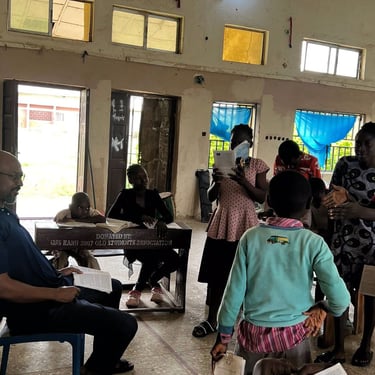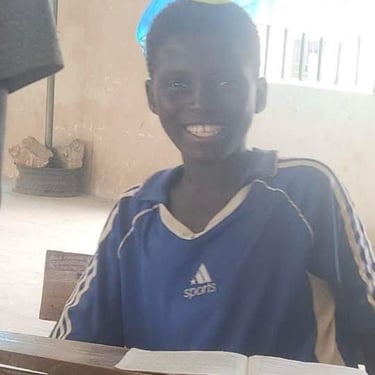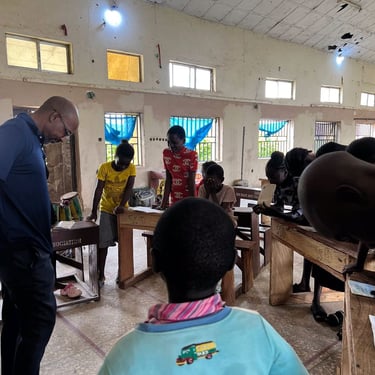Week 102 - Free Weekend Program for Children
9/22/20255 min read
Date : 2nd Aug, 2025
Text : Genesis 16
Theme : Faith and Patience.
Though God had promised Abram that his descendants would be as numerous as the stars—if he could count them—Sarai remained childless. They did not doubt God’s promise or His ability to fulfill it, but Sarai assumed it could be accomplished through her own means. While the promise was not in question, she attempted to help bring it to fruition in her own way.
One significant lesson here is that Sarai did not blame anyone for her barrenness; it was not due to her sin, her upbringing, or any external factor. She recognized the sovereignty of God and was fully convinced that all things come from Him, for He alone reigns over heaven and earth.
Is this true about us? Are we resting in the sovereignty of God, or are we preoccupied with false illusions, pointing fingers where it is unnecessary? It is comforting to know that our lives are in the hands of Almighty God—He governs every moment of our existence. Every strand of hair on our heads is numbered, and not one falls without His approval.
Sarai reasoned in her heart, “The Lord has withheld me from bearing children,” recognizing that children are a gift from God and that the fruit of the womb is His reward. However, by concluding this prematurely and assuming her situation was final, she took matters into her own hands. This was not an act of faith. Romans 14:23 states, “Whatever is not from faith is sin.” Similarly, Hebrews 10:38 reminds us that “the just shall live by faith,” and if anyone draws back, God takes no pleasure in them. The Holy Spirit does not affirm, bless, or empower anything conceived in the flesh. God has already declared that the arm of flesh will fail.
Yet Sarai devised a plan to give her maid, Hagar, to her husband Abram, and he went along with it without hesitation. Abram did not seek the Lord; he accepted the plan because it appealed to his flesh. This mirrors Adam’s response to Eve when the fruit seemed good for food, pleasing to the eyes, and desirable for gaining wisdom (Genesis 3; 1 John 2:16).
So the question for us is: Do we truly know the sovereign LORD? Do we believe His promises? Are His words real in our hearts? Have we made our requests known to Him—asking Him to make us holy and fruitful according to His promises? Are we trusting in His goodness and faithfulness? If so, we must remain in that place of trust. We cannot begin in faith and then revert to flesh-driven self-effort. We must heed Paul’s warning to the Galatians: they started by the Spirit but were bewitched into continuing by works. This is foolish. If we believe God’s promises, we must also trust Him to bring them to fulfillment. His sovereignty encompasses the means and timing; He decides how, where, and when—all for His glory and for our good (1 Thessalonians 5:24).
This is not about our presumptuous desires or preferred outcomes. It’s about God’s eternal promises—His will to make us holy and fruitful for His name’s sake (Psalm 92:14). We receive these promises by trusting in Him, not by devising clever compromises or strategies that may yield momentary success but result in painful consequences for generations.
Just as Sarai “succeeded” in her self-devised plan—Hagar became pregnant—this led to pride, tension, and strife. That is the fruit of the flesh. Where there is self-seeking, every kind of evil thrives. Even well-intentioned compromises will eventually lead to pain. Proverbs 20:17 states, “Bread gained by deceit is sweet to a man, but afterward his mouth will be full of gravel.” The arm of flesh will fail, and cursed is the one who trusts in man (Jeremiah 17:5).
If we think this does not apply to us today, we are deceiving ourselves. Consider the self-serving compromises in our lives or programs in our churches designed merely to entertain and retain members. Think of the pressure some pastors feel to “find husbands” for every faithful sister in the congregation or to open doors of prosperity for brothers through strategic positions and favors - empowerment. With no true hope of rivival, we are under pressure to pacify and to keep people coming. Though we preach and sing that Christ is our sufficiency, contentment, and true fulfillment—in practice, we often demonstrate that we do not truly believe it.
We find ourselves endlessly scheming, seeking worldly validation, and chasing fulfillment outside of Christ, because deep down, many do not find Christ alone to be enough. One preacher, under pressure, once said, “There may not be enough positions to go around, but there’s more than enough presence—if Christ is all you seek.” Similarly, a church may not have enough husbands, positions, or business opportunities to go around, and preachers dont need to resort to subtle manipulations regarding miracles—claiming that “what God cannot do does not exist”—alluding to nothing but financial gain, marital engagement, and positions of pride and control. But if we seek Christ by faith alone, the Holy Spirit will bring about revival by His grace, first in our hearts, then in our families, neighborhoods, nations, and the church—all in His own time (Acts 1:8; Acts 2:46-47).
The Lord has not promised to withhold from us anything necessary for His glory and our eternal good (Romans 8:32). He has opened the door for us to ask while calling us to trust and rest in His promises (Philippians 4:6). As believers, we need endurance. It is through faith and patience that we inherit the promise - eternal glory (Hebrews 6:12). The flesh profits nothing (John 6:63).
Sarai eventually dealt harshly with the flesh—sin—leading Hagar to flee (James 4:7). She may have experienced a moment of repentance, or at least regret, as she resorted to her husband and acted with his permission (Romans 8:13). Ultimately, the flesh was brought under subjection. It is the grace of God that subdues sin, the flesh, and Satan, ensuring they do not rule or have dominion over us (Galatians 5:17; Romans 6:14). Despite all this, Ishmael was eventually born—an entire nation came from him, the Arabs.
The consequences of acting in the flesh linger across generations. Sin rarely remains contained; it multiplies pain exponentially, affecting even those who had nothing to do with the original compromise. This is how serious it is. Romans 5:12 teaches us that through one man’s sin, death entered the world. Yet even amid consequences, God is gracious. He never abandons us. For every situation we face, He provides grace to endure (1 Corinthians 10:13), but wisdom is better than the weapons of war (Ecclesiastes 9:18).
Finally, we learn that God is sovereign—even over those outside the covenant. He rules over all. There is no certainty about Hagar’s faith, but the Lord found her in the wilderness, called her by name, and spoke to her. He instructed her to return and submit to Sarai, and she obeyed.
As Brother Heshimu pointed out, Hagar’s story reflects the gospel: how God meets us in our sinful rebellion and rejection, calling us to submit and trust in His mercy. God does not discard us; He redirects us to submission with a promise to be with us by His grace. Her return and submission reveal a deeper truth: God’s discipline is never meant to destroy us but to restore us. Hebrews 12:8–11 teaches that chastening is a sign of God’s love. Although it may feel painful, it produces the peaceable fruit of righteousness in those who are trained by it.
Therefore, we must not despise divine correction. We must put away pride, submit to God’s dealings, and trust in His mercy. His grace strengthens us, even as we navigate the consequences of our own choices. He is faithful—always.




Sovereign Grace African Foundation
Registered Charity:
1. STATE OF CALIFORNIA, USA
File No:4852691, Reg. date - 02/21/2022
2. ABUJA FCT, NIGERIA
Reg No. CAC/IT/NO 149091
Date : 7/29/2020
sgaf.org@gmail.com
